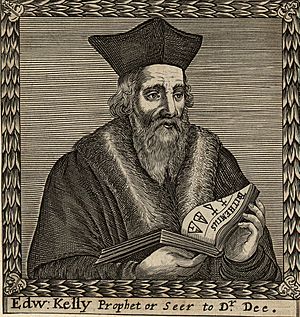John Dee facts for kids
Quick facts for kids
John Dee
|
|
|---|---|
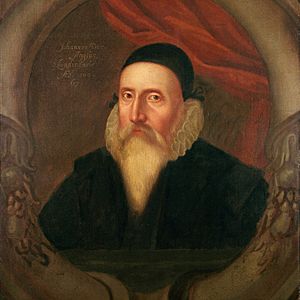
A 16th-century portrait by an unknown artist
|
|
| Born | 13 July 1527 Tower Ward, London, England
|
| Died | December 1608 or March 1609 (aged 81) Mortlake, Surrey, England
|
| Alma mater | St John's College, Cambridge Louvain University |
| Known for | Advisor to Queen Elizabeth I |
| Spouse(s) | Katherine Constable Jane Fromond |
| Children | Michael (d. 1594) Theodore (d. 1601) Arthur Rowland Madinia Frances Margaret (d. 1603) Katherine |
| Scientific career | |
| Fields | Mathematics, alchemy, astrology, Hermeticism, navigation |
| Institutions | Trinity College, Cambridge Christ's College, Manchester |
| Academic advisors | Gemma Frisius, Gerardus Mercator |
| Notable students | Thomas Digges |
John Dee (born July 13, 1527 – died 1608 or 1609) was a very smart English person. He was a mathematician, astronomer, and astrologer. He also taught others and studied alchemy and Hermetic philosophy.
John Dee was a special advisor to Queen Elizabeth I. He spent a lot of his time studying old texts and trying to understand the world's secrets. He had one of the biggest libraries in England! He also suggested that England should start colonies in new lands. He even helped create the idea of a "British Empire".
Later in his life, John Dee left the Queen's service. He wanted to learn even more about hidden knowledge and the supernatural. He traveled around Europe and worked with different people. Some thought he might be a spy for England. When he came back home, his house and library were damaged. He tried to work for the Queen again, but when James I became king, he was turned away. John Dee died poor in London, and nobody knows where he was buried.
Biography
A Young Scholar's Life
John Dee was born in London. His father, Rowland Dee, was a merchant and worked for King Henry VIII. John's family came from Wales.
John Dee went to school in Chelmsford from age 8 to 15. Then, in 1542, he went to St John's College, Cambridge. He was very good at his studies and became a fellow at Trinity College, Cambridge in 1546. People even thought he was a magician because of the cool stage effects he made for a play!
In the late 1540s, John Dee traveled in Europe. He studied at universities in Louvain and Brussels. He also gave talks in Paris about Euclid, a famous mathematician. He became friends with important mapmakers like Gerardus Mercator. He brought back many math and astronomy tools to England.
In 1552, he met Gerolamo Cardano in London. They looked into a machine that was supposed to move forever. They also studied a gem that people thought had magical powers.
In 1554, John Dee was offered a job teaching math at Oxford University. But he said no. He thought English universities focused too much on subjects like speaking and grammar. He wanted to study more science and philosophy. He hoped for a better job working for the Queen.
Facing Challenges and Helping the Queen
In 1555, John Dee was arrested. He was accused of using astrology to predict the future for Queen Mary and Princess Elizabeth. This was a serious charge, but he proved his innocence. Even so, he faced religious questions. John Dee was a very private person, which sometimes made things harder for him.
In 1556, John Dee suggested to Queen Mary that England should create a national library to save old books. His idea wasn't used, but he kept building his own huge library in Mortlake. His library became a famous place for scholars to learn.

When Elizabeth became Queen in 1558, John Dee became her science and astrology advisor. He even helped choose the best date for her coronation! He also helped England with its sea voyages. He gave advice on navigation and supported the idea of a "British Empire".
In 1564, Dee wrote a book called Monas Hieroglyphica. It was about a special symbol he created that he believed showed the unity of everything. This book was important to many people at the time.
In 1570, he wrote a "Mathematical Preface" for an English translation of Euclid's Elements. In this writing, he explained why math was so important for all other arts and sciences. This book was very popular and helped many people outside of universities learn about math.
In 1577, John Dee wrote another book about navigation. It showed his ideas for a strong navy and how England could claim lands in the New World.
Seeking Deeper Knowledge
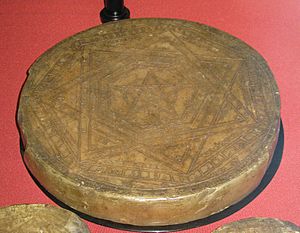
By the early 1580s, John Dee felt he wasn't learning enough about nature's secrets. He also felt less important at court. So, he started to look for knowledge in the supernatural world. He wanted to talk to spirits and angels using a "scryer" or crystal-gazer. He believed these people could help him communicate with angels.
Dee's first tries with scryers were not good. But in 1582, he met Edward Kelley. Kelley seemed to have special abilities. John Dee hired Kelley, and they started having "spiritual conferences." Dee believed these meetings with angels would help all of mankind. Dee wrote in his journals that angels spoke to him through Kelley. Sometimes, they spoke in a special "angelic" language.
In 1583, Dee and Kelley traveled to Poland with a nobleman. They continued their spiritual meetings. They even met with Emperor Rudolf II and the King of Poland. Some people thought Dee was a spy for Queen Elizabeth. The King of Poland was careful about their claims of talking to angels.
In 1587, Dee and Kelley had a disagreement during one of their spiritual meetings. Kelley made a strange request that caused Dee great sadness. Dee stopped the meetings soon after. He returned to England in 1589, while Kelley stayed in Europe.
Final Years and Legacy
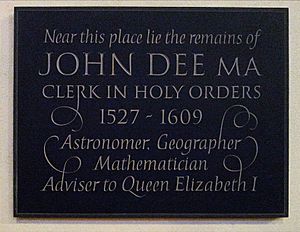
When John Dee returned to Mortlake after six years, his home was damaged. Many of his valuable books and tools were stolen. People in England were also becoming more critical of magical practices. Queen Elizabeth hoped he could convince Kelley to return to England.
In 1595, Queen Elizabeth appointed John Dee as the Warden of Christ's College, Manchester. He had trouble controlling the people there, who sometimes cheated him.
John Dee left Manchester in 1605 and returned to London. By this time, Queen Elizabeth had died, and the new King, James I, did not support him. John Dee spent his last years in poverty in Mortlake. He had to sell his belongings to support himself and his daughter, Katherine. She cared for him until he died in late 1608 or early 1609, at about 81 years old. His grave is unknown, but a memorial plaque was placed in the local church in 2013.
Personal Life
John Dee was married three times and had eight children. His first wife, Katherine Constable, died in 1574. His second wife died in 1576. Neither of them had children.
In 1578, when he was 51, he married Jane Fromond, who was 23. They had seven or eight children together. Their children included Arthur Dee, Michael, Rowland, Katherine, Madinia, Frances, Margaret, and possibly Theodore.
John Dee kept a diary from 1577 to 1601. This diary tells us most of what we know about his life during that time.
Jane, his third wife, died in Manchester in 1604 from the bubonic plague. Michael died in 1594, and Theodore died in 1601. His sons Arthur and Rowland, and his daughter Katherine, lived longer than him. Katherine took care of him until he died.
His son Arthur helped his father with his studies. He later became an alchemist and writer himself.
John Dee was described as tall and slender. He had a long, white beard and was considered a very handsome man.
Achievements
Dee's Beliefs and Ideas
John Dee was a very religious Christian. He believed that numbers were the key to all knowledge. He thought that humans could gain divine power through math.
Pushing for New Colonies
From 1570, John Dee strongly supported England becoming stronger. He wanted England to set up colonies in the New World. He wrote about how England could grow its trade and power.
His 1577 book, General and Rare Memorials pertayning to the Perfect Arte of Navigation, was meant to encourage England to build colonies overseas. He drew a picture of Britannia asking Queen Elizabeth I to protect her country with a strong navy. Dee used old stories to argue that England had a right to claim lands in the Americas. He believed new colonies would make England richer. John Dee is often given credit for inventing the term "British Empire".
Dee also claimed that Welsh explorers had discovered America long before Christopher Columbus. He used these ideas to strengthen England's claim to the New World over Spain's.
Reputation and Importance
After John Dee died, his papers were found and published. For a long time, this made people think of Dee as a strange and confused person.
However, in the 20th century, historians started to look at John Dee differently. They realized that in his time, people didn't separate magic, science, and religion as much as we do today.
Historians now see John Dee as a serious scholar and a great book collector. He was a devoted Christian, a skilled scientist, and one of the most learned men of his time. His library at Mortlake was the biggest in England. It was one of the best in Europe. He was a trusted advisor to Queen Elizabeth I. He also strongly supported England's exploration of North America.
Dee helped improve navigation and cartography (mapmaking). He studied with famous mapmakers. He also owned many maps and tools. He even created new tools and techniques for sailing in cold, polar regions. He advised English explorers and trained their pilots. He believed that math was central to all human learning. He often wrote his books in English, not Latin, so more people could read them. His "Mathematical Preface" to Euclid was very popular. It helped many ordinary people learn about math.
Today, a street near Mortlake, where he lived, is named "Dee Road" in his honor.
Calendar Reform Ideas
John Dee was friends with the famous astronomer Tycho Brahe. He also knew about the work of Nicolaus Copernicus. Copernicus said the Earth goes around the Sun. Dee used Copernican ideas in his astronomy calculations.
In 1583, Queen Elizabeth asked Dee for advice on a new Gregorian calendar that the Pope had created. Dee advised England to accept it, but with a few changes. However, England decided not to follow the Pope's suggestions.
The Voynich Manuscript
John Dee has often been linked to the Voynich manuscript. This is a mysterious book written in an unknown language. Some people thought Dee might have owned it. However, there's no clear proof in his diaries that he ever owned or sold this specific manuscript. He did own another coded book, though.
Dee's Special Objects
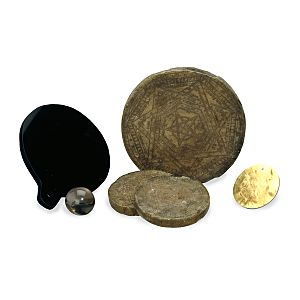
The British Museum has several items that supposedly belonged to John Dee. These items were used in his spiritual meetings:
- His special mirror, made of black obsidian.
- Small wax seals that held up the table where he did his scrying.
- A large, decorated wax "Seal of God" that held the crystal ball he used for scrying.
- A gold amulet with a picture of one of Kelley's visions.
- A crystal globe, about 6 centimeters wide.
In 2004, a shew stone (used for divining) that belonged to Dee was stolen from the Science Museum in London. It was found shortly afterwards.
Science and Magic in Dee's Time
To us today, John Dee's work seems to mix magic and modern science. But back then, people didn't see such a clear difference. He was a respected mathematician and astronomer. He was also a leading expert in navigation. He trained many people who went on important voyages of discovery for England.
At the same time, he was deeply interested in sorcery, astrology, and Hermetic philosophy. For the last 30 years of his life, he tried to talk to angels. He wanted to learn the "universal language" of creation. He believed that all his activities, from math to talking with angels, were part of his search for a deeper understanding of the world.
John Dee collected one of England's biggest libraries. His knowledge also made him important in Elizabethan politics. He advised Queen Elizabeth I and her ministers. He also taught and supported important figures like Sir Philip Sidney.
Works
- Monas Hieroglyphica, 1564
- Preface to Billingsley's Euclid (Billingsley's translation of Euclid's Elements), 1570
- Dee, John (1577). General and Rare Memorials, Pertayning to the Perfect Art of Navigation: Annexed to the Paradoxal Cumpas in Playze. https://books.google.com/books?id=LU4ytAEACAAJ.
- On the Mystical Rule of the Seven Planets, 1582–1583
- Dee, John; Kelly, Edward; Casaubon, Meric (1659). A True & Faithful Relation of what Passed for Many Yeers Between Dr. John Dee and Some Spirits. T Garthwait. ISBN 978-5-88514-094-2. https://books.google.com/books?id=1ZYTAwAAQBAJ&pg=PA497.
- Dee, John. Quinti Libri Mysteriorum. British Library, Sloane MS 3188. Also available in a fair copy by Elias Ashmole, at Sloane MS 3677.
- Dee, John (2003). Joseph H. Peterson. ed. John Dee's Five Books of Mystery: Original Sourcebook of Enochian Magic. Boston: Weiser Books. ISBN 978-1-57863-178-0. from the collected works known as Mysteriorum libri quinque
- John Dee, The Mathematicall Praeface to the Elements of Geometrie of Euclid of Megara (1570). New York: Science History Publications (1975) ISBN: 0-88202-020-X
- John Dee, John Dee on Astronomy: Propaedeumata Aphoristica (1558 & 1568) edited by Wayne Shumaker, Berkeley: University of California Press ISBN: 0-520-03376-0
- John Dee, Autobiographical tracts of John Dee, Warden of the College of Manchester, ed. James Crossley. Chetham Society Publications, Vol XXIV. Manchester, 1851
- John Dee, Diary for the years 1595–1601, ed. John E. Bailey. Privately printed, 1880
- Dee, John (1842). J.O. Halliwell. ed. The Private Diary of Dr John Dee. Camden Society. https://books.google.com/books?id=H5c8AAAAIAAJ.
See also
 In Spanish: John Dee para niños
In Spanish: John Dee para niños
- Calendar (New Style) Act 1750
- Heliocentric astrology


